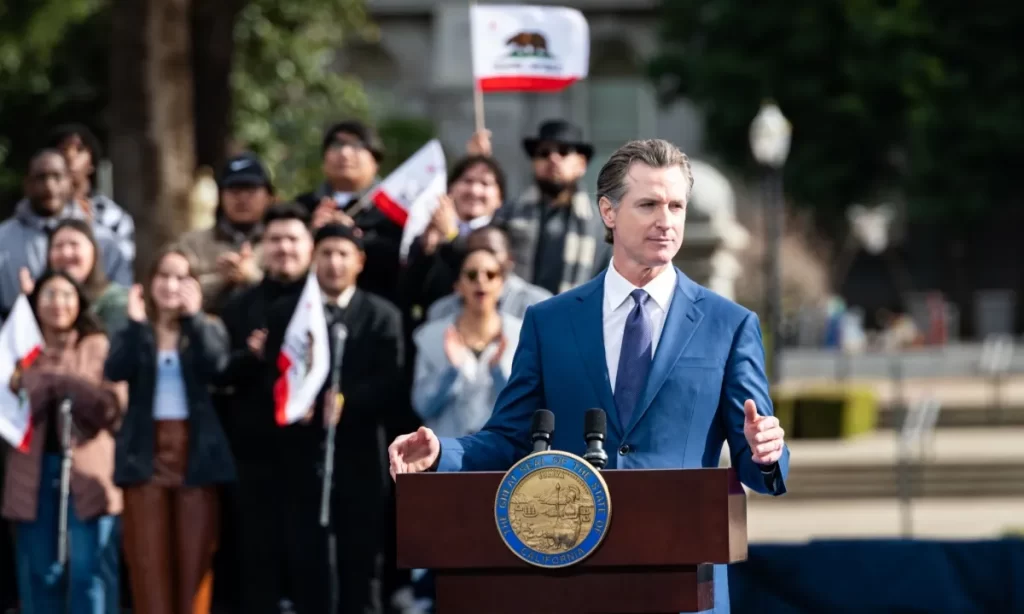California governor blocks landmark AI safety bill
3 min read
Gavin Newsom said the bill could stifle innovation and prompt AI firms to move out of California.

Gavin Newsom said the bill could stifle innovation and prompt AI firms to move out of California.
California Governor Gavin Newsom has vetoed a significant bill aimed at regulating artificial intelligence (AI), a move that has sparked controversy and concern among advocates for technology oversight. The proposed legislation sought to establish some of the first comprehensive regulations on AI in the United States but faced staunch opposition from major tech companies.
In his veto statement, Newsom expressed concern that the bill could hinder innovation and drive AI developers out of California, a state known as a global tech hub. “This legislation, as it stands, could stifle the very innovation that is critical to California’s economy and its role as a leader in technology,” he stated.
The bill, championed by Senator Scott Wiener, aimed to enforce safety protocols for advanced AI systems. Among its key provisions was the requirement for the most sophisticated AI models to undergo rigorous safety testing. It also mandated that developers implement a “kill switch,” a crucial feature allowing organizations to isolate and deactivate AI systems deemed dangerous.
Furthermore, the legislation proposed official oversight for the development of “Frontier Models,” which refer to the most powerful AI systems that could have significant societal impacts. Senator Wiener criticized the veto, arguing that without regulatory measures, companies will continue to advance powerful technologies without any government oversight, increasing risks to public safety.
Newsom argued that the bill lacked nuance, stating, “It does not account for the varying levels of risk associated with different AI applications. The stringent standards proposed apply to even basic functionalities, which is excessive.” He suggested that the bill did not sufficiently differentiate between AI systems used in high-stakes environments versus those that pose minimal risk.
Despite vetoing the bill, Newsom announced plans to develop alternative safeguards against potential AI risks, calling upon experts to assist in creating a framework for responsible technology deployment. This comes in the wake of his recent approval of 17 other bills targeting misinformation and addressing the challenges posed by deep fakes—media manipulated through generative AI technologies.
California hosts many of the world’s leading AI firms, including OpenAI, the creator of ChatGPT, making any regulatory actions taken in the state potentially influential at both national and global levels. As a result, Newsom’s decision is likely to reverberate throughout the tech industry.
Senator Wiener lamented that the veto leaves AI companies without any binding regulations, particularly as Congress remains stagnant in its efforts to impose meaningful tech industry safeguards. “This decision reinforces a concerning trend of inaction at the federal level, allowing tech companies to operate without essential oversight,” he said.
The conversation around AI regulation has intensified, especially as lawmakers grapple with the implications of this rapidly evolving technology. Major tech corporations, including OpenAI, Google, and Meta, publicly opposed the bill, arguing that it could inhibit critical advancements in AI development.
Wei Sun, a senior analyst at Counterpoint Research, provided insight into the situation, suggesting that regulating AI as a whole might be premature. “AI is a general-purpose technology still in its infancy, and blanket restrictions could hinder its potential,” she noted. Instead, Sun advocated for targeted regulations that focus on specific applications of AI that pose known risks.
As debates over AI regulation continue, the path forward remains uncertain. Advocates for oversight are calling for a more balanced approach that promotes innovation while ensuring public safety. The stakes are high, as the implications of AI technology reach into various aspects of everyday life, from healthcare to finance to personal privacy.
With the California veto, the dialogue around AI safety regulations is far from over. Stakeholders from various sectors will likely continue to advocate for a framework that addresses the challenges posed by AI while fostering an environment conducive to innovation. The outcome of this ongoing conversation will be pivotal in shaping the future of technology regulation in the United States and beyond.